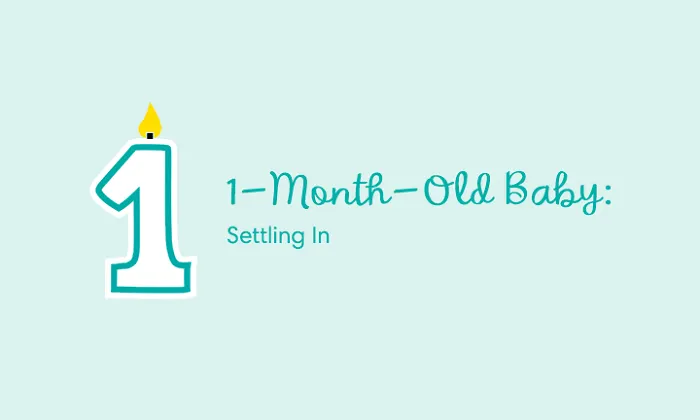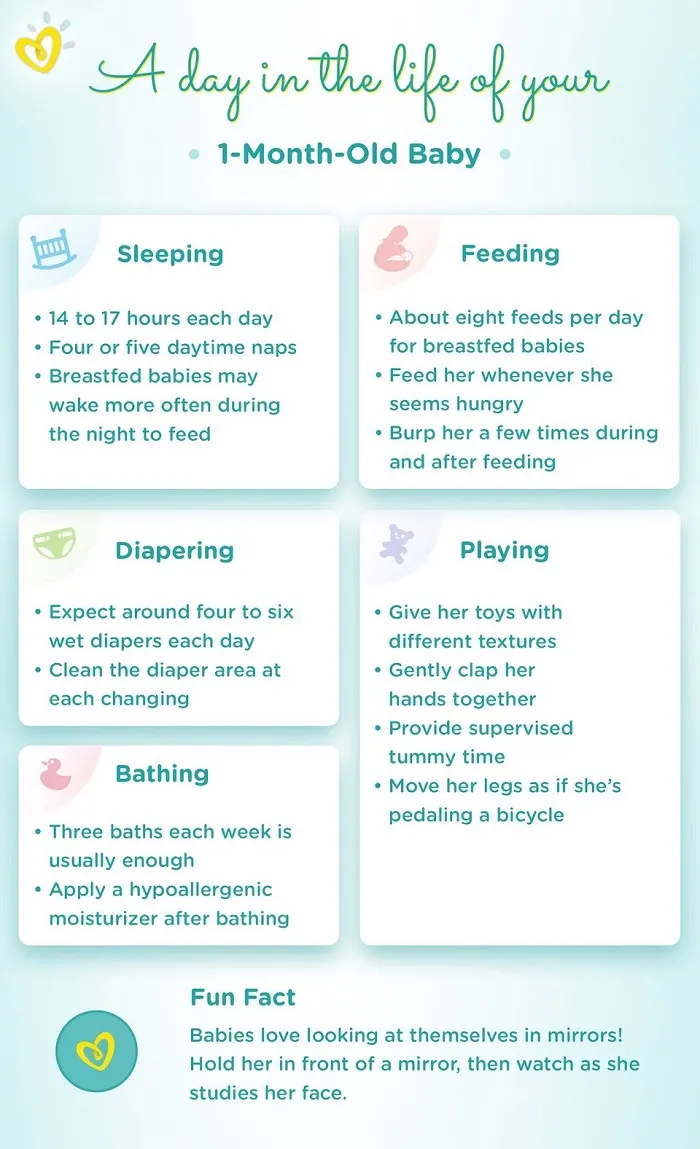One Month Old Baby – Milestones, Development, Feeding & Activities
The joy of becoming new parents is incomparable, and the first few months of bringing your little bundle of happiness home is nothing short of an exhilarating experience. The first month of bringing a baby home is a period of radical changes in your lives that began nearly a year ago with the pregnancy.
Newborn babies are ever-growing, and initially, it can be a little challenging for new parents to understand the things they must watch out for in order to ensure a healthy, nurturing and prosperous environment for your baby. New parents might still be coming to grips with caring for, feeding, exercising and understanding their baby’s many needs.
Just as a mother, a newborn baby too undergoes a number of physical developments and changes, especially during the first few months of their lives. Let us be your companion on this exciting new journey, learning every aspect of raising a baby which includes just about everything you need to know!
This comprehensive guide lists every important aspect of taking care of a newborn baby during their first month in a fascinating new world. It includes an easy and helpful guide on how to feed, clean, and change the baby, track their sleeping pattern, bodyweight and how to watch out for important developmental milestones.

1 Month Old Baby Milestones
You will need to watch out for the following milestones if you are raising a 1 month old baby that has just begun its journey into the world.
Visual Development
When it comes to visual development in a 1 month old baby, even wandering eyes and the occasional focus on objects is a good sign. As the visuals of a 1 month old baby develop, they will also begin to recognize familiar faces, and shall begin to be fascinated by brightly coloured objects. Know more about visual development of babies in their initial months.
Head and Limb Movement
A 1 month old baby and their physical development will manifest quickly through limb movements, and you will notice them vigorously wave their hands and legs from time to time. Additionally, they will also begin to move their head from side to side, and you may notice this most when they are lying on their back during diaper changes.
You will also notice the baby gain control of their fingers and toes by keeping them tightly closed and curled respectively, attempting to clinch objects with their fingers.
You might also notice a positive indicator of a milestone for a 1 month old baby as they will begin to display reflexes in the form of moving their head in the direction of sounds and upon being touched.
Hearing & Awareness Development
Among the key milestones for a 1 month old baby, hearing is one of the most crucial senses that show development. The baby will show an inclination towards voices and sounds they recognize. A 1 month old baby will also display subtle reflexes when they hear sounds such as moving their heads in the direction of the sound or voice.
Sense of Smell Development
Your baby will begin to appreciate and understand different smells during this period. In order to check the development of a 1 month old baby’s sense of smell, try to get them to react to different sweet, acidic or bitter smells.
A 1 month old baby during feeding can also recognize the smell of their mother’s breastmilk, and will react positively to it.
These are the most common and healthy developments that a 1 month old baby’s body undergoes as they and their parents get accustomed to a new life. Check out other physical changes and developments that a baby undergoes when they are a month old below;
Change in Bodyweight
The weight of a 1 month old baby may drop roughly by 5-10%, and there is no reason to worry. Initially, you might notice a drop in the baby’s body weight, but will slowly return back to normal in a couple of weeks. This drop in the weight of a 1 month old baby is caused due to the loss of fluids post-childbirth.
Feeding a Lot
There is no reason to panic if you think the baby is feeding a lot for a 1 month old since it is absolutely normal. The reason a 1 month old baby requires feeding every few hours is because their bodies and organs are tiny at the moment. The baby feels full quickly, and will demand to be fed more often during the first couple of months.
These are all the developmental milestones your baby will undergo when they are 1 month old. In order to facilitate the baby’s physical development and promote their well-being, you can use a few activities and basic exercises. Read more about newborn baby feeding.

Tracking Wet & Dirty Diapers
Babies can produce roughly four to six wet diapers a day at this stage. There's a wide range of what's "normal" when it comes to poopy diapers. Most babies will have at least one bowel movement a day but some babies may go without pooping for several days or a week. This is completely OK as long as the stool consistency is normal — that is, soft and a little runny — and your 1-month-old baby is eating well and gaining weight. Consult your baby’s healthcare provider if you’re concerned you might be seeing too few diapers.
Given all the diapering going on, keep in mind that your baby’s fragile skin needs soft, comfortable diapers — such as Pampers Premium Care diapers for newborn.
A Day in the Life of Your Baby
Here is an example of a routine for a 1-month-old baby, including bathing, sleeping, feeding, and playing:
Activities For A 1 Month Old Baby
It is possible to be under the impression that a newborn baby might not be able to understand, react to or follow much human interaction, although this is a misconception. A 1 month old baby can do a surprising number of things such as focus on faces, giggle, react to sounds, lights and other stimulus including moving their limbs, heads and suckle!
You can easily undertake the following activities to foster a positive physical and emotional bond with your child as soon as you bring them home.
Talk to them:
Sure they may not be able to understand a word of what they are hearing, but this is where ‘baby talk’ comes in. Be as silly and lovable to your baby as possible, and talk to them in a soft, comforting voice. Allow them to focus on your face, and have a conversation, always maintaining eye contact with them. Some babies are immediately receptive, even displaying subtle facial expressions this early.
Make faces:
Now this is something we have all done at least once in our lives, from our little siblings, nieces and nephews to babies we do not even know. Making faces and being silly with a baby can help a parent bond with their baby in a way unlike any other. Watch out for their favourite silly expressions, the ones that make them smile and you will learn a lot about your newborn. This is an important activity for a 1 month old baby, since it sets the tone for the future, even sometimes culminating in your baby ending up imitating your silly facial expressions.
Belly time:
Allow some time for your baby every day to lie on their belly. Do this for a couple of minutes every day as it can help develop and strengthen their body. You can gradually increase the duration after a few days. The main beneficiaries of this activity are your 1 month old baby’s back and shoulder muscles.
These activities will help your baby immensely as they slowly get accustomed to the world, getting bigger and stronger with each passing day.

Tracking The Baby’s Sleep Cycle
Another important thing to consider when raising a month old baby is to understand, track and consider their sleep cycle. Newborn babies do tend to sleep a lot, and it might be difficult at first to put a finger on their sleep cycle, but it may get easier to predict with the following tips.
Newborn babies tend to sleep a lot more than full-grown adults. A 1 month old baby might end up sleeping for a total of 15-18 hours a day, but not all at once. It is totally healthy and you have no reason to worry.
Even though newborn babies sleep a lot, their sleep cycles are erratic and it may take time for patterns to emerge. Usually, they wake up when they are disturbed or feel hungry, and fall asleep soon after they have been feed or feel tired.
To care for a newborn baby in the 1st month, you must let the baby dictate when they wish to be fed since it will immediately be followed by a short, or hopefully a long nap.
Sometimes even the faintest sounds may end up waking your baby, and it is completely okay since they are wired that way. Babies experience a much shorter non-REM sleep as compared to adults who have a longer REM sleep pattern. Don’t worry since it gradually ends up changing but be prepared for an easily awoken newborn during the first few weeks.
You’re all set to care for a 1 month old baby with this easy-to-follow guide on how to track their milestones, carry out growth-friendly activities and gauging the newborn baby’s sleep cycle.
Know more about understanding your newborn baby & diapering your infant only on Pampers India!





